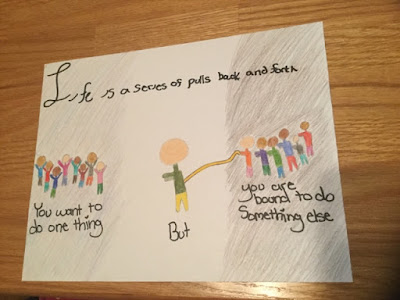I learned a lot this year. One important thing I learned this year was what indepepent and dependent variables, phrases, and fragments are, along with what the differences is between all of them. This is important because I use these in my writing, and now I know how to properly use them in sentences. Another thing I learned was the importance of commas and how to use them correctly. This will greatly help my writing in the future. I also learned by improving my skills on writing introductions and conclusions in an essay or paper.
I think I will always remember the butterfly project. I say this because this was one of the few big projects that I have done in middle school, and it took a lot of time and effort to complete it. I will also remember it because of all the amazing butterflies other people created and shared. I feel this project brought out the artistic ability of everyone and I enjoyed looking at everyone's creations. As well as creating my own.
One of the nicest things someone did for me this year was help me when I was having difficulties. I remember once I was at a complete blank and I couldn't think of what to do for the work I was doing. My table partner helped me by giving me some ideas to help me push through the mind blank I was having. In the end, this greatly helped me as I was then able to continue and complete my work.
Something I, and other classmates, taught our teacher is a new way of looking at Tuesday's with Morrie, along with the other books we read this school year. I remember, during one of the Socratic Seminars, we were talking about our thoughts on Tuesdays with Morrie, and someone said something that made our teacher say how she never thought of the book that way. I know that while reading Tuesday's with Morrie, we showed our teacher different ways of thinking about the book and its meaning.
I feel that I have made the biggest improvements in my writing skills. I have learned different tips on becoming a better writer, and I have used them in my writing and it shows how much I've learned. I've also improved in my writing by learning new vocabulary words, which has helped me because I use new words while I'm writing, so I don't use the same words over and over again. Instead I can now think of synonyms to words such as "good", "bad", or "sad", and it makes my writing sound more sophisticated, and it makes it more interesting for other people to read.
For me, the most challenging part of this year was either the butterfly project, or the Morrie aphorism project. The butterfly project was difficult because it took lots of thinking to come up with a design. It also took time and effort to create the butterfly and make it represent the poem it was based off of. The aphorism project was difficult because it also took a lot of thinking to come up with a visual to represent the aphorism it was based on.
The piece of writing that I'm most proud of is my Narrative essay. Out of all the things I have done this year, that has been my favorite assignment. I have never enjoyed an assignment so much. Writing it was a lot of fun, which is part of the reason that this is what I'm most proud of. Along with it being an enjoyable experience, I enjoy reading it and thinking back to the moment the essay is referring to. Going into the essay I thought it was going to be very difficult to write, but while writing it, I noticed that it was fairly easy. Looking at the finished essay, then and now, I am very proud of what the end result looks like. The essay might not be the best writing I've ever done, but it's certainly the one I'm most proud of.
My biggest accomplishment, and the best piece of writing that I have done all year, was the argumentative essay. A lot of time and work went into writing that essay and I am extremely proud of what came out of it. I believe that all the research and facts that I put into my argumentative essay came together very well, and made the whole thing flow and really show the reader how strongly I feel about the topic.
Of the books I've read this year my favorite would have to be To Kill a Mockingbird. To Kill a Mockingbird is filled with so many lessons and important values. I believe that it could show a person a different way of thinking. A lot could be learned from that book. This book always kept me interested, and it was a book that I actually enjoyed reading.
To the students next year, I would mainly give them the advice to always do their work. I would tell them that If you fail to do what needs to be accomplished, there will be consequences, and there is no getting around those consequences. I would tell the students that as long as you do what needs to be done, all will be fine with Mrs. Larson. I would also tell the future students that there will be some times where it may seem too difficult to continue, but all they have to do is push through and do what needs to be done, because it won't always be like that. Most of all, I would tell the future students "good luck!"















